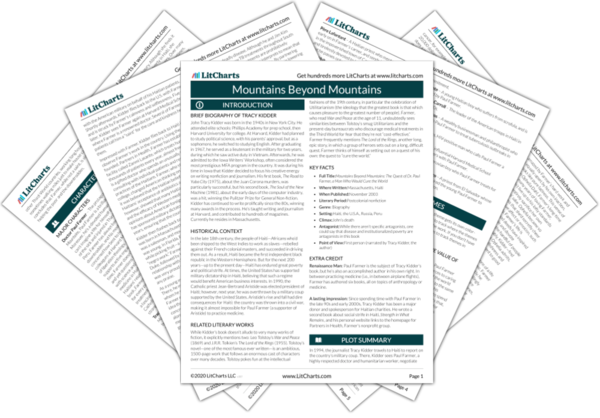Summary
Analysis
It’s April 1998, and a special meeting of tuberculosis specialists, organized by Howard Hiatt, gathers in Boston. Farmer’s hospital in Lima has treated 53 patients over the last 2 years, and more than 85% of these patients have been completely cured. Hiatt has been so impressed by this news that he’s organized the TB panel to celebrate Farmer’s achievement.
Fortunately, Farmer has been enormously successful in Peru. Other people always seem to want to give him awards and praise, but Farmer himself only moves on to the next challenge—to the “mountains beyond mountains.”
Themes
At the panel, doctors argue that MDR is the result of human error, meaning that it’s a testament to a country’s bad medical practices. One doctor, Arata Kochi, argues that Farmer’s innovations in Lima have changed TB treatment forever: from now on, the emphasis will be on treating individual patients, regardless of the costs, so that drug-resistant strains won’t spread throughout the community.
Farmer’s most important achievement in Peru is arguably to change the way Peru deals with outbreaks of disease. The emphasis is no longer on saving money in the short term: thanks to Farmer’s speeches and work, the Peruvian government is more willing to invest large amounts of money in treating patients here and now, recognizing that this is the best way to avoid further outbreaks in the future.
Themes
One of Hiatt’s colleagues, a doctor named Alex Goldfarb, talks about his experiences treating TB in Russian prison populations. Hiatt and Farmer explain how expensive it is to treat TB, but add that the costs of treatment are actually lower than the costs of waiting to treat MDR-TB later on. Goldfarb explains that his budget is limited: even if he could devote his time to treating MDR, he’d still only have the money to treat a small fraction of his patients in Russian prisons. Goldfarb makes an important point, Hiatt acknowledges: sooner or later, doctors have to face the reality that their time and money is limited, even if, in a perfect world, it would be better to treat all cases of MDR.
Goldfarb is a harsh realist, but he’s making a very important point. In a perfect world, doctors would have the money to cure every sick patient on the planet. But this simply isn’t the case: doctors have to choose which patients they care for, and which ones they ignore. This necessarily means that doctors have to “play favorites” whether they want to or not. Farmer has spent most of his career refusing to believe in the finitude of human resources: he wants to believe that he can spend his life “curing the world.”
Themes
On the second day of the conference in Boston, Jim Kim discusses his work with PIH in Peru. He argues that money for TB treatment should come from private donors, rather than government programs—the reason is that government programs are unreliable and frequently subject to corruption. He concludes that doctors should never underestimate the efforts of a small group of people, such as Farmer and his PIH team.
So far, Farmer’s cooperation with Tom White supports Jim Kim’s argument: it’s easier for all concerned when private donors support PIH. But the problem with private donors is that they’re unreliable, too: they change their minds, lose their money, and—inevitably—they die and pass on their money to someone else.
Themes
Get the entire Mountains LitChart as a printable PDF.













